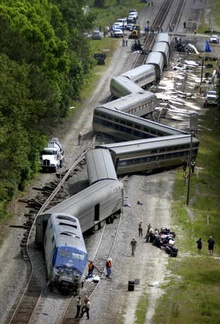Train wrecks grab people’s attention. Having someone on board keeps their attention.
Exhibit A: Charlie Sheen.
Attempting to cash in on his recent celebrity meltdown, this weekend the actor launched his 20-city variety show in Detroit. Apparently, Charlie Sheen bombed. He was heckled, booed, and eventually abandoned by the 5,000+ fans, proving it’s easier to get people there, than to keep them.
They came to see a train wreck, but discovered no one was on board.
Forgive the unseemly parallels, but there’s a lesson here for writers. It goes something like this: Getting a reader’s attention and keeping a reader’s attention are two very different things.
I was thinking about this when I read literary agent Rachelle Gardner’s post Why “No” Comes Quickly… but “Yes” Seems to Take Forever. She writes,
Recently on my blog, a commenter mentioned it would be nice if agents and editors would actually read a manuscript before rejecting it. The truth is, we read exactly as much as we need to. It’s not necessary for an editor or agent to read more than a few pages to determine if it’s a “no.” It takes a lot longer to determine if it’s a “yes.” (emphasis mine)
Apparently, what grabs an agent and what keeps them are two very different things. Or are they? Perhaps what grabs them is what keeps them reading, and what keeps them reading is potentially what sells the story. But what keeps a person reading, whether or not they are an agent, is different per individual.
Either way, the first step to keep someone reading is to grab their attention. Here’s four common ways that writers grab a reader’s attention in their first couple of pages.
- Train wrecks — explosions, action, chase scene, sex scene, murder, mayhem, mystery, etc.
- Compelling premise — what the reader understands about where the story is going keeps them reading, even through a slow or lackluster beginning.
- Interesting characters — someone so quirky, so charismatic, so interesting, so smart, so evil, so despondent, so upbeat, we can’t help but want to follow them.
- Good form — command of the language, lovely prose, economy of words, brevity, precision, consistent POV, authorial voice, realistic dialog, etc.
As a reader, which of these four elements are you looking for in the first few pages? Or do you think that’s unfair? Do you think an author deserves more than just the first few pages to grab your attention? And do you think that agents and editors are too quick to reject stories based on such slim evidence?
I can totally relate to Rachelle’s description. As a reader, it’s “not necessary for [me] to read more than a few pages” to determine if I want to stay with a writer. I recognize that readers bring different expectations to those first pages (which is why we often chafe against what agents seem to want). Nevertheless, what grabs you is not necessarily what grabs me.
Using the above “opening elements,” here’s what I look for in the first few pages, in order of their importance to me:
- Good form
- Compelling premise
- Interesting characters
- Train wrecks
No amount of train wrecks or interesting characters will keep me reading a book that is not well-written and does not have a compelling premise. In the long-run, an intriguing storyline will keep me reading despite average writing. As long as I feel a story is going somewhere I want to go, I can put up with serviceable prose. Nothing grabs me more in the first pages of a book than good writing. Conversely, nothing turns me off more in the first pages of a book than poor writing. But that’s just me.
The least interesting opening to me is the train wreck. Which is funny, because I think train wrecks have become one of our most conventional openings. Perhaps television and cinema are to be blamed for this, I don’t know. I’m not suggesting you start your book without action, but that no amount of action can sustain a poorly written book, without interesting characters, that is going nowhere. Detonate a nuclear bomb in chapter one if you like, but if we’re not in safe hands by chapter two, I won’t stick around for the fallout.
While grabbing readers may entail orchestrating train wrecks, keeping them is another story. For if there’s no one on board, you will most likely find the editor waving off spectators: “Nothing here to see, folks. Move along.”
* * *
Question: As a reader, (1) What grabs you and (2) What keeps you? Are they the same thing or different? Do you agree that a compelling plot can keep someone reading through an inferior opening? Out of the four “opening elements” I listed, what is their order of importance for you as a reader?














I’ve grown so tired of hearing so many variants of the exact same premise I now look for things that are uniquely different. Different characters, style and no more ‘perfect characters.’ Then I look at story. Characters and premise are where most stories go wrong. There are only so many re-treads one can read.
Well really, you do need a well-written opening so that the book isn’t thrown across the room to shouts of, “I could do better than this!” The opening doesn’t need to be a train wreck, but it really should have decent writing. A compelling plot runs throughout the entire novel, and it’s what makes the reader turn the page and buy the next book you’ve written.